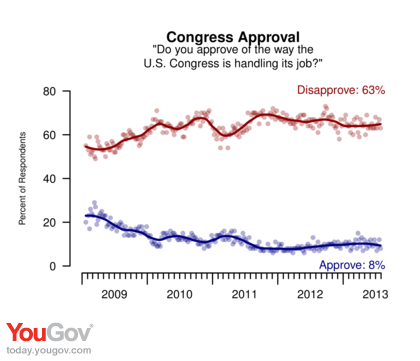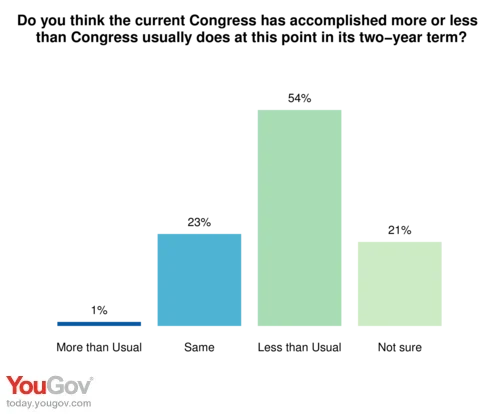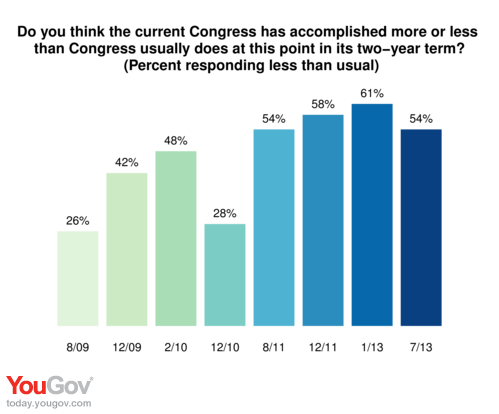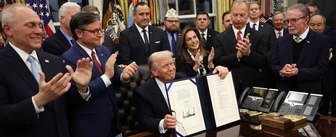(Week of 7/29/2013) As Congress heads for its August vacation, Democrats are being reminded by President Obama they should talk about jobs. House Republicans received a memo from their Conference noting they should pay attention to women and Hispanics, as well as the other groups with which they are having trouble.
These groups present major issues for each party. The latest Economist/YouGov Poll found that neither party had an advantage on the economy – or on creating jobs. However, both men and women agreed that the Democrats were better for women. At the same time whites, blacks and Hispanics thought that party was best for Hispanics.
Representatives of both parties have other, more general concerns. The approval rating for Congress in that same poll is in the single digits, and a majority think that this Congress has done “less than usual.”

Congessional approval has been hovering at 10% or below for nearly two years, but it wasn’t much higher than 20% even at the start of the Obama honeymoon in 2009. Typically, YouGov Polls get somewhat lower approval ratings than other polls – they ask respondents whether they approve, disapprove, or “neither approve or disapprove.” But the low approval numbers, in some cases the lowest approval rating ever, have been seen in other polls as well. The Gallup poll averages for this year and for 2012, hovering in the mid-teens, are the lowest ever found in that poll in its decades of asking about Congress. At times, the approval rating in other polls has dropped into the single digits. Many other polls register even higher disapproval rating than YouGov’s 68%. More than 80% have expressed dismay with Congress in Gallup and ABC News Polls.

More critically for Congress is that people don’t necessarily think it’s doing very much at all. Part of that is just the nature of the job that Congress does. It debates (or bickers, if you prefer that word). The result of that apparently endless discussion is also a perception that Congress does little.
That has not always been the case. A Gallup Poll conducted in December 1965 found many more saying Congress had accomplished more than usual that year – a far cry from the most recent measurement.

Of course, 1965 was the year the Voting Rights Act (the subject of a recent Supreme Court ruling) became law. Congress also enacted Medicare and Medicaid, car emis- sions standards, cigarette labeling and highway beautification. It is perhaps remark- able that only 44% thought that had been a particularly session!
So perhaps the current finding, with more than half thinking Congress is doing less than usual, shouldn’t be seen as so negative. In 1965, the Democrats controlled
both the Presidency and both Houses of Congress. In 2013, there is divided control. Congress managed to pass a Hurricane Sandy relief bill and just passed student loan legislation, but so far it has passed fewer bills than the last Congress (the least productive legislatively since World War II) had by this point in time.
The last few years – since Republicans took control of the House in the 2010 elec- tions – have brought a marked change in opinions of Congress. Even in spring 1995, during the Congressional session that was to lead to a government shutdown, nearly as many said that Congress – in its first 100 days – had done more than usual than had thought the opposite. As late as August 2009, Americans were more will- ing to say that Congress accomplished as much as its predecessors than to say it was either better or worse.
However, in the last few years, opinion of Congress has gone downhill, with both parties saying the legislative branch is just getting worse.
In Economist/YouGov Polls, the percentages saying each Congress had accomplished less than its predecessors has doubled since August 2009. Retrospective as- sessments of the 111th Congress improved after the 2010 elections (even after many of that Congress’s members were defeated at the polls). Yet the 112th Congress did not enjoy that same recovery. A Huffington Post/YouGov Poll conducted as that Congress ended in January 2013 found only 3% thinking it had accomplished more than earlier Congresses, and only 20% saying it had done just as much. 61% thought it had done less than previous Congresses.

In fact, in all Economist/YouGov Polls since 2011, majorities answered that the current Congress had done less than usual. While party wrangling on the Hill may be what’s keeping the public from seeing positive outcomes emerging from Washington, this is one outcome that rank and file partisans outside the Beltway can agree on.
Economist/YouGov poll archives can be found here.
Images: Getty







